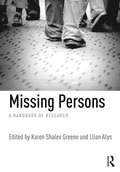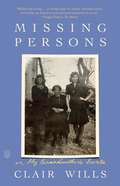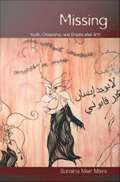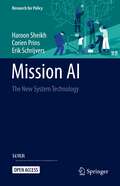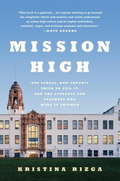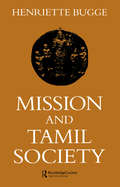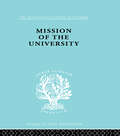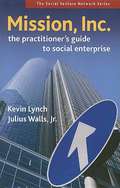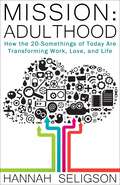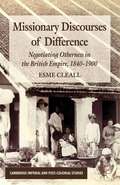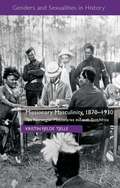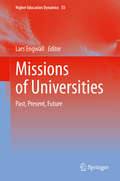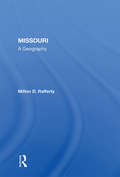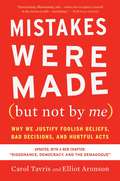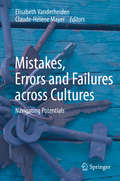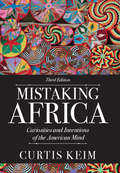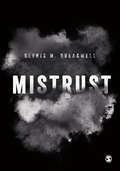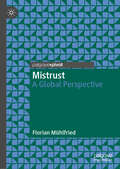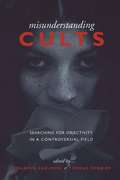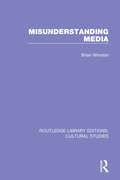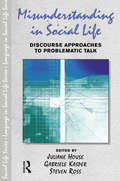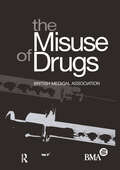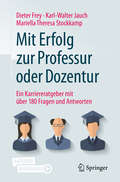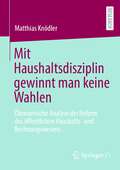- Table View
- List View
Missing Persons: A handbook of research
by Karen Shalev Greene Llian AlysA missing person is an individual whose whereabouts are unknown and where there is some concern for his or her wellbeing. In the UK, around 250,000 people are reported missing every year, with the majority being children under the age of 18. Despite the fact that missing persons are a social phenomenon which encompasses vast areas of interest, relatively little is known about those who go missing, what happens to them while they are missing, and what can be done to prevent these incidents from occurring. <P><P> This groundbreaking book brings together for the first time ideas and expertise across this vast subject area into one interconnected publication. It explores the subjects of missing children, missing adults, the investigative process of missing person cases, and the families of missing persons. <P><P> Those with no prior knowledge or professionals with focused knowledge in some areas will be able to expand their understanding of a variety of topics relevant to this field through detailed chapters which advance our understanding of this complex phenomenon, discuss what is unknown, and suggest the best and most important steps forward to further advance our knowledge.
Missing Persons: or, My Grandmother's Secrets
by Clair WillsHow far would you go for the missing? Blending private and public history, cultural analysis, family memoir, and autobiography, Clair Wills explores profound questions about memory, loss, motherhood, and emigration. She traces a history of sexual secrecy through four generations of unplanned pregnancies in her own family, stretching from the 1890s to the 1980s and from the West of Ireland to Massachusetts, London, and the English countryside, dramatizing the power of secret-keeping as a form of care, but also as a form of violence and exclusion. At the heart of her search is a cousin who went missing from her own family, born in a mother-and-baby home in the 1950s, and brought up in an institution. Wills asks not only what happened, but why? Why did families consent to the institutional care and control of unmarried mothers and their children? Why did the system make sense to ordinary families, and how can we make sense of it now? What questions should we be asking about guilt, blame, and responsibility? In order to uncover how people thought about illicit sex, illegitimacy, and institutions, Wills follows the tracks laid down in family stories and anecdotes. She interprets the gaps as places where the past was both preserved and disavowed. We are all born into families, regardless of whether we are allowed to belong to them. In Missing Persons, Wills asks us to undertake a radical reshaping of our idea of the family. We are all part of the historical archive—the remembering and forgetting is in us, whether we like it or not.
Missing: Youth, Citizenship, and Empire After 9/11
by Sunaina Marr MairaIn Missing, Sunaina Marr Maira explores how young South Asian Muslim immigrants living in the United States experienced and understood national belonging (or exclusion) at a particular moment in the history of U. S. imperialism: in the years immediately following September 11, 2001. Drawing on ethnographic research in a New England high school, Maira investigates the cultural dimensions of citizenship for South Asian Muslim students and their relationship to the state in the everyday contexts of education, labor, leisure, dissent, betrayal, and loss. The narratives of the mostly working-class youth she focuses on demonstrate how cultural citizenship is produced in school, at home, at work, and in popular culture. Maira examines how young South Asian Muslims made sense of the political and historical forces shaping their lives and developed their own forms of political critique and modes of dissent, which she links both to their experiences following September 11, 2001, and to a longer history of regimes of surveillance and repression in the United States. Bringing grounded ethnographic analysis to the critique of U. S. empire, Maira teases out the ways that imperial power affects the everyday lives of young immigrants in the United States. She illuminates the paradoxes of national belonging, exclusion, alienation, and political expression facing a generation of Muslim youth coming of age at this particular moment. She also sheds new light on larger questions about civil rights, globalization, and U. S. foreign policy. Maira demonstrates that a particular subjectivity, the "imperial feeling" of the present historical moment, is linked not just to issues of war and terrorism but also to migration and work, popular culture and global media, family and belonging.
Mission AI: The New System Technology (Research for Policy)
by Erik Schrijvers Corien Prins Haroon SheikhThis open access book offers a strategic perspective on AI and the process of embedding it in society. After decades of research, Artificial Intelligence (AI) is now entering society at large. Due to its general purpose character, AI will change society in multiple, fundamental and unpredictable ways. Therefore, the Netherlands Scientific Council for Government Policy (WRR) characterizes AI as a system technology: a rare type of technologies that have a systemic impact on society. Earlier system technologies include electricity, the combustion engine and the computer. The history of these technologies provides us with useful insights about what it takes to direct the introduction of AI in society. The WRR identifies five key tasks to structurally work on this process: demystification, contextualisation, engagement, regulation and positioning. By clarifying what AI is (demystification), creating a functional ecosystem (contextualisation), involving diverse stakeholders (engagement), developing directive frameworks (regulation) and engaging internationally (positioning), societies can meaningfully influence how AI settles. Collectively, these activities steer the process of co-development between technology and society, and each representing a different path to safeguard public values. Mission AI - The New System Technology was originally published as an advisory report for the government of the Netherlands. The strategic analysis and the outlined recommendations are, however, relevant to every government and organization that aims to take up 'misson AI' and embed this newest system technology in our world.
Mission High: One School, How Experts Tried to Fail It, and the Students and Teachers Who Made It Triumph
by Kristina Rizga"This book is a godsend . . . a moving portrait for anyone wanting to go beyond the simplified labels and metrics and really understand an urban high school, and its highly individual, resilient, eager and brilliant students and educators. ” --Dave Eggers, co-founder, 826 National and ScholarMatch Darrell is a reflective, brilliant young man, who never thought of himself as a good student. He always struggled with his reading and writing skills. Darrell’s father, a single parent, couldn't afford private tutors. By the end of middle school, Darrell’s grades and his confidence were at an all time low. Then everything changed. When education journalist Kristina Rizga first met Darrell at Mission High School, he was taking AP calculus class, writing a ten-page research paper, and had received several college acceptance letters. And Darrell was not an exception. More than 80 percent of Mission High seniors go to college every year, even though the school teaches large numbers of English learners and students from poor families. So, why has the federal government been threatening to close Mission High--and schools like it across the country? The United States has been on a century long road toward increased standardization in our public schools, which resulted in a system that reduces the quality of education to primarily one metric: standardized test scores. According to this number, Mission High is a "low-performing” school even though its college enrollment, graduation, attendance rates and student surveys are some of the best in the country. The qualities that matter the most in learning--skills like critical thinking, intellectual engagement, resilience, empathy, self-management, and cultural flexibility--can’t be measured by multiple-choice questions designed by distant testing companies, Rizga argues, but they can be detected by skilled teachers in effective, personalized and humane classrooms that work for all students, not just the most motivated ones. Based on four years of reporting with unprecedented access, the unforgettable, intimate stories in these pages throw open the doors to America’s most talked about--and arguably least understood--public school classrooms where the largely invisible voices of our smart, resilient students and their committed educators can offer a clear and hopeful blueprint for what it takes to help all students succeed.
Mission and Tamil Society: Social and Religious Change in South India (1840-1900)
by Henriette BuggeLooks to provide an analysis of religion as a dynamic factor in Indian society. Not only is the ritual, economic and power status of the missionaries examined but also such effects on their converts as social status and mobility.
Mission of the University (International Library of Sociology)
by Jose Ortega GassetIn 1930, the great Spanish philosopher Jos Ortega y Gasset set forth a program for reforming the modern Spanish university. Aware that the missions of the university are many and often competing, Ortega built his program around a conception of a "general culture" that knows no national boundaries or time limits and could fit into any national system of higher education. His ideas are especially pertinent to contemporary debate in America over curriculum development and the purpose of education. In this volume Ortega sought to answer two essential questions: what is the knowledge most worth knowing by all students and what is the function of the university in a modern democracy? Basing his answers on his own deep personal culture and an extensive knowledge of the various European university systems, Ortega defined four primary missions: the teaching of the learned professions, the fostering of scientific research, training for political leadership, and finally the creation of cultured persons with the ability to make intellectual interpretations of the world. Ortega's understanding of "general culture" is set out in great detail here. He meant an active engagement in ideas and issues that were both historical and contemporary. His concern is with the classical problems of justice, the good society, who should rule, and the responsibilities of citizenship. This edition first published in 1998. Routledge is an imprint of Taylor & Francis, an informa company.
Mission, Inc.: The Practitioners Guide to Social Enterprise
by Kevin Lynch Julius WallsIn this groundbreaking book, Julius Walls and Kevin Lynch offer a complete guide to confronting the complexities these businesses present.
Mission: How the 20-Somethings of Today Are Transforming Work, Love, and Life
by Hannah SeligsonGen Y has been picked apart by analysts, statistics, and trend reports, which often portray 20-somethings in negative, one-dimensional terms like "entitled" and "whiners". In this thought-provoking new book that aims to dispel these stereotypes, journalist Hannah Seligson chronicles the lives of seven individuals who embody this generation, exploring their challenges and ambitions in vivid detail and sketching a picture, through their eyes, of what life is actually like for young adults. Through these first-hand stories, readers will discover the transformational effect this enterprising, open-minded, innovative, and diverse generation is having on society."Zeitgeist reporter Hannah Seligson details this new path to adulthood in a book that promises to be illuminating, surprising, and provocative— both for Gen Y readers themselves and for people who want to understand this charming yet sometimes infuriating generation. I need this book. What is "nexting" and "jacked"? —Gretchen Rubin, New York Times Bestselling Author of THE HAPPINESS PROJECT and HAPPIER AT HOME
Missionary Discourses of Difference
by Esme CleallMissionary Discourse examines missionary writings from India and southern Africa to explore colonial discourses about race, religion, gender and culture. The book is organised around three themes: family, sickness and violence, which were key areas of missionary concern, and important axes around which colonial difference was forged.
Missionary Masculinity, 1870–1930
by Kristin Fjelde TjelleWhat kind of men were missionaries? What kind of masculinity did they represent, in ideology as well as in practice? Presupposing masculinity to be a cluster of cultural ideas and social practices that change over time and space, and not a stable entity with a natural, inherent meaning, Kristin Fjelde Tjelle seeks to answer such questions.
Missions of Universities: Past, Present, Future (Higher Education Dynamics #55)
by Lars EngwallThis book provides an analysis of university missions over time and space. It starts out by presenting a governance framework focusing on the demands on universities set by regulators, market actors and scrutinizers. It examines organizational structures, population development, the fundamental tasks of universities, and internal governance structures. Next, the book offers a discussion of the idea and role of universities in society, exploring concepts such as autonomy and universality, and the university as a transformative institute. The next four chapters deal with the development of universities from medieval times, through the Renaissance, towards the research universities in the nineteenth century in Europe and the United States. The following five chapters analyse recent developments of increasing external demands manifested through evaluations, accreditations and rankings, which in turn have had effects on the organization of universities. Topics discussed include markets, managers, globalization, consumer models and competition. The book concludes by a discussion and analysis of the future challenges of universities.
Missouri: A Geography
by Milton RaffertyMissouri-from the gateway arch in St. Louis to the Pony Express stables in St. Joseph, from the Ozarks of the south to the rolling, corn-studded hills of the north-is the subject of this comprehensive geography. Dr. Rafferty brings together a wealth of information about Missouri's resources and people, tracing the theme of persistence versus change
Mistakes Were Made (but Not By Me) Third Edition: Why We Justify Foolish Beliefs, Bad Decisions, and Hurtful Acts
by Elliot Aronson Carol TavrisA NEW EDITION UPDATED IN 2020 • Why is it so hard to say "I made a mistake" — and really believe it? When we make mistakes, cling to outdated attitudes, or mistreat other people, we must calm the cognitive dissonance that jars our feelings of self-worth. And so, unconsciously, we create fictions that absolve us of responsibility, restoring our belief that we are smart, moral, and right—a belief that often keeps us on a course that is dumb, immoral, and wrong. Backed by decades of research, Mistakes Were Made (But Not by Me) offers a fascinating explanation of self-justification—how it works, the damage it can cause, and how we can overcome it. Extensively updated, this third edition has many recent and revealing examples, including the application of dissonance theory to divisive social issues such as the Black Lives Matter movement and he said/she said claims. It also features a new chapter that illuminates how cognitive dissonance is playing a role in the currently polarized political scene, changing the nation&’s values and putting democracy itself at risk. &“Every page sparkles with sharp insight and keen observation. Mistakes were made—but not in this book!&” —Daniel Gilbert, author of Stumbling on Happiness &“A revelatory study of how lovers, lawyers, doctors, politicians—and all of us—pull the wool over our own eyes . . . Reading it, we recognize the behavior of our leaders, our loved ones, and—if we&’re honest—ourselves, and some of the more perplexing mysteries of human nature begin to seem a little clearer.&” —Francine Prose, O, The Oprah Magazine
Mistakes, Errors and Failures across Cultures: Navigating Potentials
by Elisabeth Vanderheiden Claude-Hélène MayerThis volume provides comprehensible, strength-based perspectives on contemporary research and practice related to navigating mistakes, errors and failures across cultures. It addresses these concepts across cultural contexts and explores any or all of these three concepts from a positive psychology or positive organisational perspective, highlighting their potential as resources. The volume further discusses the consequences of errors and failures at individual, organisational and societal levels, ranging from severe personal problems to organisational and collective crises, perspectives how those can be turned into opportunities for contingent and sustainable improvement processes. The book shows that there are significant cultural differences in the understanding, interpretation and handling of errors and failures. This volume provides practical guidance for transcultural understanding of mistakes, errors and failure through new models, ideas for self-reflection, therapeutic and counselling interventions and organisational change management processes. This book is a must for researchers and practitioners working on mistakes, errors and failures across cultures and disciplines!
Mistaking Africa: Curiosities and Inventions of the American Mind
by Curtis KeimFor many Americans the mention of Africa immediately conjures up images of safaris, ferocious animals, strangely dressed "tribesmen,” and impenetrable jungles. Although the occasional newspaper headline mentions genocide, AIDS, malaria, or civil war in Africa, the collective American consciousness still carries strong mental images of Africa that are reflected in advertising, movies, amusement parks, cartoons, and many other corners of society. Few think to question these perceptions or how they came to be so deeply lodged in American minds. Curtis Keim’s Mistaking Africa looks at the historical evolution of this mind-set and examines the role that popular media plays in its creation. Keim addresses the most prevalent myths and preconceptions and demonstrates how these prevent a true understanding of the enormously diverse peoples and cultures of Africa. Updated throughout, the third edition includes a new chapter, "Where Is the Real Africa," discussing the multifaceted nature of the question and the importance of not grasping onto stereotypes of Africa’s mythical past. Keim also includes new examples and new images to expand the visual narrative of western views about Africa. Mistaking Africa is an important book for African studies courses and for anyone interested in unraveling American misperceptions about the continent.
Mistrust
by Glynis M. BreakwellMistrust in the 21st century is a major societal concern. This book: - explores social psychological processes that explain why and how mistrust develops - considers the effects that it has upon those who are mistrustful and those who are mistrusted - offers a model of mistrust in individuals and communities which is based on theories of identity and social representation. With examples ranging from the the 1872 US presidential election to the Trump era, it also considers Brexit, and has a significant focus on the Covid-19 pandemic. By looking at the role of social media, and how mistrust can be weaponised this book interrogates its place in our society. Ultimately, whilst feeling mistrust is part of being human this book warns that we ignore mistrust at our peril. Dame Glynis M. Breakwell is Professor Emeritus at the University of Bath in the Department of Psychology and has Visiting Professorships at Imperial College, London, University of Surrey and Nottingham Trent University.
Mistrust
by Glynis M. BreakwellMistrust in the 21st century is a major societal concern. This book: - explores social psychological processes that explain why and how mistrust develops - considers the effects that it has upon those who are mistrustful and those who are mistrusted - offers a model of mistrust in individuals and communities which is based on theories of identity and social representation. With examples ranging from the the 1872 US presidential election to the Trump era, it also considers Brexit, and has a significant focus on the Covid-19 pandemic. By looking at the role of social media, and how mistrust can be weaponised this book interrogates its place in our society. Ultimately, whilst feeling mistrust is part of being human this book warns that we ignore mistrust at our peril. Dame Glynis M. Breakwell is Professor Emeritus at the University of Bath in the Department of Psychology and has Visiting Professorships at Imperial College, London, University of Surrey and Nottingham Trent University.
Mistrust: A Global Perspective
by Florian MühlfriedThis book examines the social practice of mistrust through the lens of social anthropology. In focusing on the citizens of the Caucasus, a region located at the crossroads of Europe and Asia, Mühlfried counters the postcolonial discourse that routinely treats these individuals, known for their mistrust of the state, as “others.” Combining ethnographic observations presenting mistrust as an observable reality with socio-political issues from a non-Western region, Mühlfried opens up a non-Eurocentric perspective on an underexplored social practice and a major counterpoint to the well-examined social phenomenon of “trust.” This perspective allows for a more profound understanding of pressing issues such as populist movements and post-truth politics.
Misunderstanding Cults: Searching for Objectivity in a Controversial Field (The Royal Society of Canada Special Publications)
by Benjamin Zablocki Thomas RobbinsMisunderstanding Cults provides a uniquely balanced contribution to what has become a highly polarized area of study. Working towards a moderate "third path" in the heated debate over new religious movements or cults, this collection includes contributions from both scholars who have been characterized as "anticult" and those characterized as "cult-apologists." The study incorporates multiple viewpoints as well as a variety of theoretical and methodological perspectives, with the stated goal of depolarizing the discussion over alternative religious movements. A prominent section within the book focuses explicitly on the issue of scholarly objectivity and the danger of partisanship in the study of cults. The collection also includes contributions on the controversial and much misunderstood topic of brainwashing, as well as discussions of cult violence, children brought up in unconventional religious movements, and the conflicts between alternative religious movements and their critics. Unique in its breadth, this is the first study of new religious movements to address the main points of controversy within the field while attempting to find a middle ground between opposing camps of scholarship.
Misunderstanding Media (Routledge Library Editions: Cultural Studies)
by Brian WinstonThe 1980s saw constant reports of an information revolution. This book, first published in 1986, challenges this view. It argues that the information revolution is an illusion, a rhetorical gambit, an expression of profound historical ignorance, and a movement dedicated to purveying misunderstanding and disseminating disinformation. In this historically based attack on the information revolution, Professor Winston takes a had look at the four central information technologies – telephones, television, computers and satellites. He describes how these technologies were created and diffused, showing that instead of revolution we just have ‘business as usual’. He formulates a ‘law’ of the suppression of radical potential – a law which states that new telecommunication technologies are introduced into society only insofar as their disruptive potential is contained. Despite the so-called information revolution, the major institutions of society remain unchanged, and most of us remain in total ignorance of the history of technology.
Misunderstanding in Social Life: Discourse Approaches to Problematic Talk (Language In Social Life)
by Gabriele Kasper Juliane House Steven RossMisunderstanding is a pervasive phenomenon in social life, sometimes with serious consequences for people's life chances. Misunderstandings are especially hazardous in high-stakes events such as job interviews or in the legal system. In unequal power encounters, unsuccessful communication is regularly attributed to the less powerful participant, especially when those participants are members of an ethnic minority group. But even when communicative events are not prestructured by participants' differential positions in social hierarchies, misunderstandings occur at different levels of interactional and social engagement. Misunderstanding in Social Life examines such problematic talk in ordinary conversation and different institutional settings, including socializing events and story tellings, education and assessment activities, and interviews in TV news broadcasts, employment agencies, legal settings, and language testing. The analyzed interactions are located in a variety of sociocultural environments and conducted in a range of languages, including English, French, German, Hebrew, Japanese, such language varieties as Aboriginal Australian English and Maori New Zealand English, and nonnative varieties. The original studies included in this volume adopt a variety of theoretical perspectives, including discourse-pragmatic approaches, conversation analysis, interactional sociolinguistics, social constructionism, tropological and narrative analysis. They represent multiple views of misunderstanding as a multilayered discourse event.
Misuse of Drugs
by British Medical AssociationProvides practical information for professionals who help drug misusers. The book surveys the facts which influence drug use and problems arising from it, whether weekend experimentation or heroin dependence. The emphasis is on improving current practice and integrating the treatment that can be offered by medical and non-medical professionals.
Mit Erfolg zur Professur oder Dozentur: Ein Karriereratgeber mit über 180 Fragen und Antworten
by Dieter Frey Karl-Walter Jauch Mariella Theresa StockkampMit diesem Ratgeber bereiten Sie sich erfolgreich auf eine Professur vor und erkennen Stolpersteine und Hürden auf Ihrem Weg zur Professur. Klar, prägnant, gut strukturiert, unterhaltsam und lehrreich zugleich, basiert diese hilfreiche Lektüre fast 200 Fragen von Jungwissenschaftler*innen auf ihrem Weg zur Professur, die in über 25 Workshops gestellt wurden. Wissenschaftlich fundierte psychologische Exkurse, praktische Checklisten sowie Erfahrungsberichte namhafter Professor*innen runden den Inhalt ab. Dazu ist der Karriereratgeber digital angereichert und so können Sie Ihr neu erworbenes Wissen anhand von 50 Fragen und Antworten auf der Springer Nature Flashcard App jederzeit kondensiert abrufen. Zielgruppen: Das Buch richtet sich an Wissenschaftler*innen jeder Karrierestufe und begleitet Sie auf dem Weg zu Ihrer Traumstelle: Von der Entscheidung für eine wissenschaftliche Karriere bis zu Ihren ersten Tagen in der Professur. Im Mittelpunkt des Buchs steht der Bewerbungsprozess inklusive des Umgangs mit Berufungskommissionen. Zu den Autoren und der Autorin: Prof. Dr. Dieter Frey ist Leiter des LMU Center for Leadership and People Management und Mitglied der Bayrischen Akademie der Wissenschaften. Prof. Dr. Dr. hc Karl-Walter Jauch ist Ärztlicher Direktor und Vorsitzender des Vorstands am Klinikum der Universität München. Mariella Theresa Stockkamp, M.Sc. Psych., ist wissenschaftliche Mitarbeiterin am LMU Center for Leadership and People Management.
Mit Haushaltsdisziplin gewinnt man keine Wahlen: Ökonomische Analyse der Reform des öffentlichen Haushalts- und Rechnungswesens
by Matthias KnödlerDas herkömmliche Rechnungswesen der öffentlichen Verwaltung ist die Kameralistik. Diese ist den gestiegenen Anforderungen aus Sicht von Wissenschaft und Praxis nicht mehr gewachsen und wird in Teilen der öffentlichen Hand seit nunmehr zwei Jahrzehnten durch die Doppelte Buchführung (Doppik) abgelöst. Das vorliegende Buch untersucht die Wirkungen dieser Reform auf das Handeln der betroffenen Akteure.Es wird der Frage nachgegangen, ob und gegebenenfalls unter welchen institutionellen Bedingungen das doppische Haushalts- und Rechnungswesen bzw. die darin integriertenInstrumente im kommunalen und staatlichen Bereich den mit der Einführung verbundenen Erwartungen gerecht werden kann. Untersucht werden deshalb die Fragen nach effizienzfeindlichen Institutionen der Finanzsteuerung und deren konzeptioneller Berücksichtigung in der Doppik. Dabei werden die Grenzen der Reform, aber auch die organisationsbezogenen Effizienzpotenziale der Einführung von dezentraler Budgetierung, Zielvereinbarungen und einem auf Quasiwettbewerb beruhenden Controllings theoretisch fundiert nachgewiesen und Lösungsvorschläge abgeleitet.
